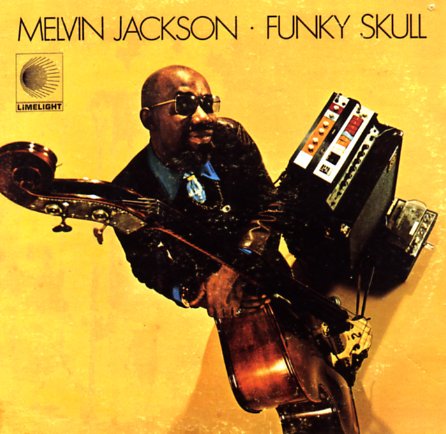

Dorothy Ashby: The Moving Finger
From The Rubaiyat of Dorothy Ashby (Cadet, 1970)
Melvin Jackson: Funky Skull, Pts 1 & 2
From Funky Skull (Limelight, 1969)
My prior post on Common, with special mention to Cadet/Cadet Concept, reminded me that Chicago’s own Dustygroove Records has recently inaugurated what I think(?) is their first ever reissue series and not surprisingly, they started close to home with a few major Chicago albums high on the soul/funk collector lists.
Dorothy Ashby’s three song cycle for Cadet in the late ’60s, Afro Harping, Dorothy’s Harp and especially the last in the trio, The Rubaiyat of Dorothy Ashby all easily are $100+ on original vinyl, a testament to both their desirability as well as relative rarity. For whatever reason though, The Rubaiyat is the toughest to come by. I don’t know if that’s because it was more rare than the previous two volumes or simply – more sought-after, with less turnover.
In whichever case, if the idea of a “funky harpist” seems antithetical to you, Ashby shuts down any doubt on these three albums though credit for that probably lies more with the production/arrangement genius of Charles Stephney at Cadet than Ashby’s inherent gifts (she’s cut many jazz albums but her Cadet output was notably different from the rest) but regardless, the funk influence on much of her work is obvious from jump.
The Rubaiyat is, in actuality, the least “funky” of her three albums, though it’s also the more adventurous, with excursions in Eastern musical aesthetics and a broader sense of jazz creativity. However, “The Moving Finger” is a stand-out, partially because it is so richly funky, partially because the recitation of the poetry of Omar Khayyam makes for a hazy, trippy experience. It’s like a jazzier version of something from a David Axelrod album.
As surreal as Ashby’s album can get, it finds equal competition with another one of Dustygroove’s “Essential Reissues”: the well-named Funky Skull by Chicago bassist Melvin Jackson (who made his name playing with Eddie Harris’ band). As the cover suggests, Jackson hooks up his acoustic bass to a Maestro G2 filter box, a Boomerang, an Echo-Plex and an Ampeeg amplifier. I have no idea what most of that means, but that’s probably what explains how incredibly spaced out Jackson’s bass is on many of these songs. “Funky Skull,” the title track, is probably the least eccentric of all the songs on the album (though his cover of Harris’ “Cold Duck Time” is at least recognizable) so you can only imagine how experimental much of Funky Skull can get. By the way, that’s guitar great Phil Upchurch (another Cadet alum) on here and Morris Jennings bumpin’ things out on the drums.
Note: the album wasn’t actually on Cadet (though it would have nicely fit on the label), but rather Limelight, a solid jazz imprint (a subsidiary of Mercury) that was better known for its straight ahead jazz albums as well as amazing packaging. Seriously – if you ever get a chance to check out certain gatefold titles on Limelight, you absolutely should. Personally, I recommend Milt Jackon’s At the Museum of Modern Art.


chatter